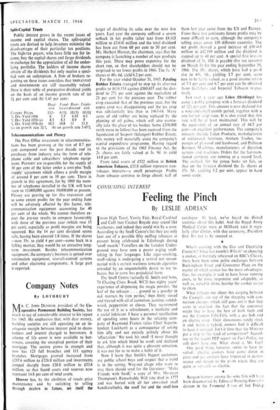Company Notes
By LOTHBURY
MR. C. JOHN DUNHAM, president of the Co- operative Permanent Building Society, has much to say of considerable interest in his report fur 1965. He emphasises that, with dear money, building societies are still operating on an in- adequate margin between interest paid to share- holders and interest charged to borrowers. A scheme of life cover is now available to bor- rowers, covering the unexpired portion of their mortgage. The society grows in strength and now has 123 full branches and 111 agency branches. Mortgages granted increased from £297.6 million to £326.9 million and investments jumped sharply from £38.8 million to £53.6 million, so that liquid assets and reserves now represent 14.8 per cent of total assets.
Hoover has, by the abolition of resale price maintenance and by switching to selling through dealers in future, set itself the target of doubling its sales over the next five years. Last year the company suffered a severe setback in net profits (after tax) from £4.115 million to £3.616 million and the total dividend has been cut from 60 per cent to 50 per cent. Mr. Herbert Hoover, the chairman, says that the company is launching a number of new products this year. These may prove expensive for the short run, so that shareholders should not be surprised to see lower profits in 1966. The 5s. 'A' shares at 40s. 6d. yield 6.2 per cent.
For the year ended October 31, 1965, Pataling Rubber Estates managed to step up its after-tax profits to £634,334 against £560,437 and the divi- dend to 275 per cent against the equivalent of 25 per cent for the previous year. The rubber crop exceeded that of the previous year, but the copra crop was disappointing and the tea crop was substantially less than in 1963-64. Many acres of old rubber are being replaced by the planting of oil palms, which will also eventu- ally take the place of tea bushes. Some £208.008 (with more to follow) has been received from the liquidation of Seaport (Selangor) Rubber Estate; this money will materially assist the company's capital expenditure programme. Having regard to the provisions of the 1965 Finance Act, the 2s. shares are fairly valued at 3s. 9d. to yield 14.8 per cent.
From total assets of £522 million in British American Tobacco, £35.8 million represent non- tobacco interests-a small percentage. Profits from tobacco continue to forge ahead; half of them last year came from the US and Europe. From these two continents future profits may be more difficult to earn, although the company's selling areas cover 150 different countries. The net profit showed a good inerease of £10.463 million to £42.199 million and the dividend is stepped up to 40 per cent. A special first interim dividend of Is. 10d. is payable (for tax reasons) on March 31 for the year ending September 30, 1966. The 10s. shares, which have had a good rise to 69s. 9d., yielding 5.7 per cent, seem now to be fairly valued, as a good income return of 7.1 per cent and 6.7 per cent can -be obtained from Gallahers and Imperial Tobacco respec- tively.
Just °ter a year ago Liden (Holdings) be- came a public company with a forecast dividend of 321. per cent. This amount is now declared for a nine-and-a-half-month period, together with a one-for-ten scrip issue. It is also stated that this rate w ill be at least maintained. This will be the equivalent of an annual rate of 44.7 per cent-an excellent performance. The company's interests include Liden Products, manufacturers of whitewood furniture, Arnhem Timber, im- porters of ply w cod and hardwood, and Pullman Business Machines, manufacturers of dictation systems and machines. Orders for the last-men- tioned company are running at a record level. The outlook for the group looks set fair, so that on the forecast dividend the 2s. shares at 17s. 3d., yielding 5.2 per cent, appear to have some scope.






































 Previous page
Previous page